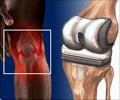An improved coating technique that could strengthen the connection between titanium joint-replacement implants and a patients' own bone has been developed by researchers.

Implants coated with "flower bouquet" clusters of an engineered protein that mimics the body's own cell-adhesion material fibronectin made 50 percent more contact with the surrounding bone than implants coated with protein pairs or individual strands. The cluster-coated implants were fixed in place more than twice as securely as plugs made from bare titanium -- which is how joints are currently attached.
Researchers believe the biologically-inspired material improves bone growth around the implant and strengthens the attachment and integration of the implant to the bone. This work also shows for the first time that biomaterials presenting biological sequences clustered together at the nanoscale enhance cell adhesion signals. These enhanced signals result in higher levels of bone cell differentiation in human stem cells and promote better integration of biomaterial implants into bone.
Source-Eurekalert
 MEDINDIA
MEDINDIA



 Email
Email





